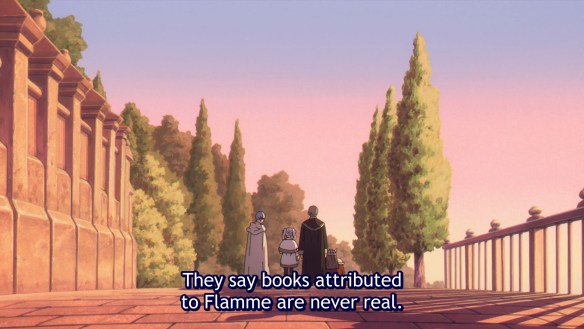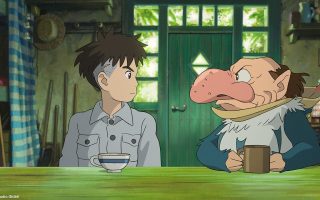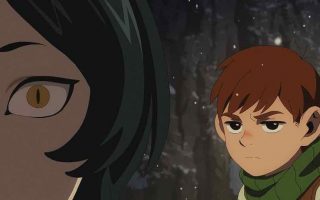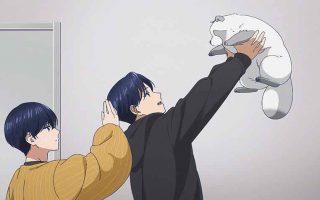Hello folks, and welcome back to Wrong Every Time. Today I’m eager to return to the wanderings of Frieren and her companions, as the warrior Stark joins them on their journey to the land where souls rest. Having bound himself to one village due to his fear of unsuitability as a warrior, Stark ultimately learned he was far stronger than he’d imagined, dispatching the dragon that haunted him without ever requiring the assistance of his accompanying mages.
Stark’s tale served as a fine embellishment on Frieren’s core themes, emphasizing how easily our perspective can become bound by self-imposed limitations, but also how a happy life can be found practically anywhere, so long as we remain open to experience and present in the lives of those around us. It was only Stark’s untested self-image that kept him tethered to his village, but fear soon shifted to a sense of responsibility, and from that to a genuine love of his community. Whether we roam widely or commit ourselves to our homes, the world is full of wonders that only ask us to keep our eyes and ears open, ready to appreciate what is precious in each new day. Let’s see what our adventurers ramble into this time!
Episode 7
We open with a flashback to the original party, with Frieren once again discussing Flamme’s grimoires. There’s more to life than grimoires, Frieren
Frieren admires the craftsmanship of a particularly well-made grimoire forgery. A lovingly crafted fake is a thing of great value in its own right
“When all you see are fakes, you start to doubt the original exists at all.” “Flamme, the founder of humanity’s magic, is like a fairy tale herself.” Their words speak to the ambiguous nature of “authenticity” itself, how stable truths are themselves subject to erosion and reimagining. Flamme was a historical figure for a time, but the distance since her era has shifted her into a figure of legend, whose true actions or even existence are subject to debate. Nothing stays the same for all time, not even our understanding of past events
“I’m probably the only one who remembers her face.” Through her longevity, Frieren is actually placed out of step with the modern world, which possesses a shorter collective memory than her personal recollections. If you live long enough, the world shifts to an unrecognizable shape that nonetheless possesses total self-assurance, a larger-scale version of the unmooring children feel as things that were assumed to be constants shift over the accumulation of years. The world only remains stable so long as you remain young enough to have never seen it transform – and in seeking to reclaim that stability, you only doom yourself to a reactionary incompatibility with a fluid world
Waking early from her dream, Frieren earns some semi-sarcastic accolades from her new companions
Fern’s sense of humor can be a little hard to follow, since she’s such a generally low affect person. I appreciate how the show continues to characterize her as distinctly marked by her experience, rather than simply embracing a collective gang dynamic
“Like a Fairy Tale”
Their daily quests continue to emphasize the importance of being present in this world, of embracing labors that will leave it a little gentler than you found it. When Stark asks why they don’t simply float a cart over a landslide rather than repairing the road itself, Frieren responds that “that wouldn’t help the people who come after us,” a philosophy adopted from Fern
“The northern lands have been fighting demons here and there. This landslide was probably caused by one such skirmish.” A distinctly Frieren perspective – rather than focusing on the dramatic battle, we instead prioritize its repercussions, how one clash of titans impacted the lives of countless travelers seeking to travel along this pass. Our actions create ripples, for better or for worse
Stark complains about Fern’s alternately formal or brusque way of addressing him. He’s a pretty sensitive character, whereas Fern is blunt and pragmatic, more driven by noble causes, but less sentimental in her personal bearing
This production team understands the inherent humor of Frieren’s weird little head poking over things, whether it’s background objects or the frame edge itself
The scenery shifts as we continue north, featuring more imposing hills and valleys than the arable grasslands to the south
Frieren reveals that she’s rarely met other elves, that elves generally possess little romantic or reproductive instincts, and that her species is consequentially going extinct
“Perhaps we’re closer to the end than I thought.” A pretty universal sentiment, particularly in our own era of climate apocalypse
Their guide informs them that today is the Liberation Festival, celebrating Himmel and his party’s defeat of the local demons
Only seeing their great battles in brief flashbacks like this really emphasizes the fickleness of “power” and inevitability of ruin. Heiter was a great mage once, but his heroics are already passing into myth
“Humans love to make a fuss. They hold festivals for everything.” It’s better than letting our precious stories fall out of memory, Frieren!
Reflecting on why he’s so insistent on commissioning statues, Himmel states that it’s “so you won’t be alone in the future. We weren’t fairy tales. We really existed.” Memorials are a way of fighting back against the limitations of our collective memory, of insisting that people lived and died passionate, important lives even beyond the scope of our limited memories and stories. A practice of particular importance for Frieren, whose longevity relative to everyone else means she will inevitably end up living in a world of “fairy tales,” of events that were real and personal for her, but which have frayed to no more than myths in society’s reckoning
“Will they still be doing this a hundred years from now?” “Yes, if the town still stands.” “What about a thousand?” Even our attempts to endure in cultural memory fade eventually, on a long enough time frame
They next approach a walled city perched on a high hilltop, with scorched earth and sharpened logs around it speaking to the frequency of clashes with demons
Perspective shots and shots peering at the party from the street’s edge create a sense of vulnerability and surveillance, further amplifying the threat implied by the establishing shot
Apparently there are demons in town – Graf Granat, the town’s presumed leader, is strolling with Lord Lugner, a smartly dressed humanoid demon
Lugner is a peace envoy
He notes that while the townsfolk at least see him as a human, Frieren sees him as a wild beast
“You demons are wild beasts who imitate human speech but can’t be communicated with.” Whew, that sure is a fraught conception of humanity’s enemies! Basically just old-fashioned DnD racism, the classic “if we define creatures who aren’t part of our society as innately evil, we don’t have to feel bad about exterminating them.” It doesn’t tend to lend itself to particularly thoughtful storytelling – it’s the refuge of the colonist, seeking only to assuage their own conscience
I do appreciate Frieren just sort of glumly accepting being carted off like a sack of potatoes
“They said to reflect on your actions for two or three years.” “That’s shorter than I expected. Can you bring me some grimoires later?” Goddamnit Frieren
Apparently Aura the Guillotine, one of the Demon Lord’s seven generals, has been embroiled in battle with this town for years. They’re now suing for peace
“Trying to talk to demons is pointless.” Framing demons as a sort of otherworldly, implacable force of destruction is one thing, but “they’re basically like people, except wholly dedicated to evil” naturally lends itself to interpreting whole races as “subhuman” in some fundamental way. Most modern fantasy fiction tends to avoid or complicate this framework
We’re treated to a flashback demonstrating that even young demons can’t relate to human morality. Fraught thematics aside, it just feels sorta… lazy? Creatures that are incapable of growth aren’t particularly interesting dramatically, particularly in this story which is otherwise so attuned to our capacity for personal transformation
“Flamme the Legendary Mage defined monsters who are capable of human speech as ‘demons.’” So what is a monster, then? Are there harsh guidelines delineating “monsters” from other creatures of the wilderness? This whole thread seems to lean into how thinly sketched this world is; the adaptation can do a lot to breathe life into it, but the original work is basically just in a DnD world
“She’s the only one of this town who understands the true nature of us demons.” The peace envoy helpfully explains that we need not trouble ourselves with the moral ambiguity of this situation. The author is directly telling us what to think
It’s unfortunate, because I feel like there actually is a lot of room for interesting drama in demons that simply cannot relate to human morality, but are nonetheless fully conscious, independent creatures. “They are all cuckoos imitating human babies and we are right to exterminate them” is both queasiness-inducing and a lot less interesting
Granat reveals that he only invited Lugner into the city to take revenge for his dead son. However, he is swayed by Lugner’s feigned attempt at sympathy
Meanwhile, one of his attendants heads off to kill Frieren
And Done
Whew, that was a messy stretch of worldbuilding! Framing demons as capable of speech only insofar as it furthers their goals of killing all humans doesn’t even really hold up to in-world scrutiny, setting aside its clumsiness relative to Frieren’s more thoughtful thematic material. Still, Frieren’s worldbuilding has never been particularly inspired, more gamified than lived in, with the adaptation doing most of the heavy lifting in terms of bringing this world to life. This isn’t the first time great production teams have had to do their best with questionable source material, and it won’t be the last; personally, I’m just hoping we get through this digression swiftly, and back towards the sort of material where Frieren’s author tends to excel.
This article was made possible by reader support. Thank you all for all that you do.




